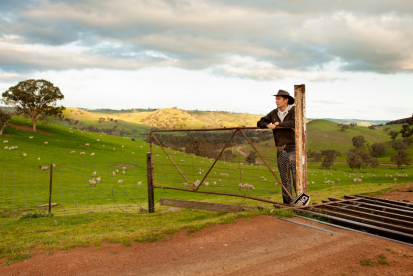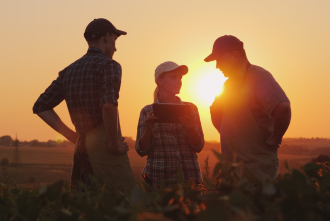Farmers are here to feed their families.
A standard narrative in the agricultural industry that gets trotted out at most agricultural conferences, blogs, and marketing messages is that "our job as a farming industry is to feed the world." It sounds noble and lofty, but it is untrue and does not benefit farming businesses, their families, or their communities.
Farmers' produce in every state and country does feed the world, but that's not their main reason for farming. While farming is an essential job, like many others in our connected economy, feeding the world is not their primary motivation or the focus of their business decisions. If it were, they wouldn't remain in business for long.
The role of your farm business is to focus on your triple bottom line:
People (family), Planet (soils & environment) and Profit.
I will argue that most farmers and supporting agribusiness professionals in the first world do not choose to enter the agriculture industry with the noble aim of feeding the world. They are in the business of feeding themselves and their families.
If you are part of a family farming business, there is a high chance that you have grown up the son or daughter of a farmer and either grew to love the business and the work, or it is all you felt you could do after leaving school or university. You were born into it and, in most cases, inherited the business from the previous generation.
If you purchased your farm without inheriting it, you did this for two reasons:
- If you are a smaller family business, you chose the industry because you loved growing things and the work involved in farming. You believed you could make a good enough living from it to keep you in the lifestyle you would like to become accustomed to.
- If you are a large corporate farming organisation, you are in farming because it is a good business that makes good profits and has healthy capital growth. It is a good investment and gives you and your shareholders a good return on capital.
Suppose you are an agribusiness that either supplies the farm business with inputs or buys and sells agricultural commodities produced by the farm business. In that case, you are in this business to maximise your profit and grow the business's net worth.
Every farm business in the first world aims to maximise business profit and minimise financial risk to feed their families or give a healthy financial return to their shareholders.
If they could do this by growing less food, then they would have the responsibility to do so to their family and their shareholders.
Every farm business in the first world aims to maximise business profit and minimise financial risk to feed their families or give a healthy financial return to their shareholders.
So why does the industry insist on disingenuously repeating this mantra at any given opportunity?
Firstly, it makes us all feel good about ourselves, believing we have a higher noble purpose than other people in the economy with whom we live in a co-dependent relationship. When people outside of agriculture comment on anything from animal welfare and taxation to chemical and fertiliser use, we feel we have the right to ignore them. We are exempt from these rules and concerns because we are unique and feeding the world.
Secondly, agribusinesses that supply inputs or trade agricultural commodities are interested in maximising agricultural production as they profit from buying and selling in volume. So, more grain, wool, meat, lettuce, bananas, chemicals, fertiliser, bags, pipes, equipment, and machinery are always better.
Thirdly, the challenge of feeding the world is real and pressing. To feed the world by 2050, we will need to produce about 70% more food than in 2010.
As a world, we will need a coordinated effort through research and innovation to meet this challenge. However, telling farmers to grow more food will not do the job, as their first and only job is to feed their families.
To feed the world by 2050, we will need to produce about 70% more food than in 2010.
What do you do as a farm business?
As a farm business and an agribusiness, your first and only job is to turn a long-term sustainable profit and build a healthy balance sheet that allows you to invest further in your business and weather the increasingly volatile climate and commodity markets. Because a profitable farm business can look after the soil and the environment it depends on, it can invest in research and development to reduce chemical and fertiliser use and develop more efficient varieties of plant and animal breeds.
If the world wants you to grow more food at a price you are willing to grow it for, it will send you this signal through the short and long-term commodity market prices.
If you genuinely want to take on the challenge and the mission of feeding the world, work in or invest in innovation, research, and development that help meet this future challenge. Or take your farming skills to the third world and work with farmers and their supporting agencies to help them improve production and reduce wastage, as many of these people cannot afford the food we grow anyway.
As a farmer, your role is to manage your triple bottom line: People (family), Planet (soils & environment), and Profit.
Only farmers who focus on these three things will have a hope of feeding the world in the future.




